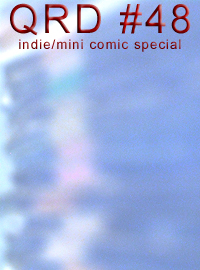
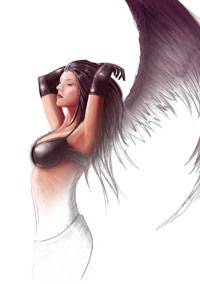
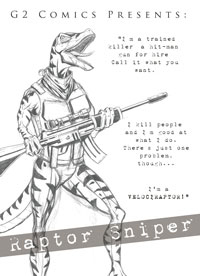
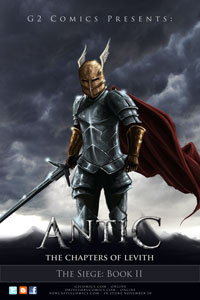
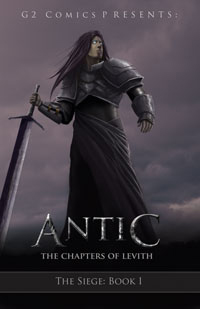
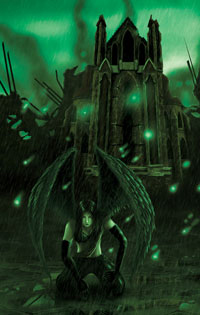
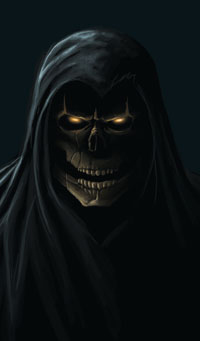
February 2011
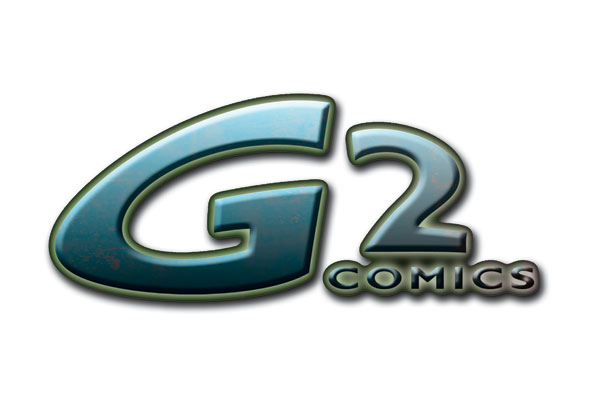
City: Ofallon, MO
Comics: The Triad, Antic: The Chapters of Levith, Raptor Sniper
Websites: www.g2comics.com
QRD How old were you when you first got into comics & did you always stick with them or did you come back to them?
Daniel I was about 14 years old when I got into comics. I followed Spawn & Ascension for a while, I was attracted to the endless possibilities that you have in comics.
QRD What was the first comic book you ever bought?
Daniel Archie & Jughead cant remember what issue.
QRD How old were you when you put out your first comic?
Daniel 19yrs. old - The Adventures of Jenkins (DC Conspiracy).
QRD What decade do you think produced the best comics?
Daniel 2000. Im all about the advancement of the artwork.
QRD Why comics instead of just writing or drawing?
Daniel Comics give you the opportunity to tell a story & the comic genre has a lot more ways to reach an audience than writing & fine-art.
QRD Do you see mini-comics & indie comics as paths to mainstream comics or as their own unique media?
Daniel They are their own unique media. The creators of these books are very passionate about their work & it shows through their art & writing. Indie producers are more accessible & willing to talk to their fans about their work.
QRD How many copies of your comic do you print in your first run?
Daniel 50.
QRD How much do you think comics should cost?
Daniel To print: $1.00 Sell: $2.00 (24 page color)
QRD How many books do you produce a year & how many would you like to?
Daniel 6-8. We would like to produce two per month.
QRD Do you think stories should be serialized or delivered as complete works?
Daniel Serialized. We have to make money somehow. Independent companies (especially those that are just getting started) do not have the manpower to produce 12 books per year. When starting out, the money needs to be made off each issue so the next can be funded.
QRD How are comic strips different than comic books & which medium do you prefer?
Daniel Comic Strips are for stories that can be told quickly & are usually on a more immature level. Comics are for elaborate stories & artwork that require a full 24 (or more) page book to accurately convey the action & emotion that goes into telling the tale.
QRD How long is it from when you start a comic until its printed?
Daniel About 2 months.
QRD What do you better with your comics now than when you first started?
Daniel In every book that we do, the art progresses to another level. The experience in the field helps ones talent grow by a combination of learning new techniques from others & seeing what works & what doesnt in the retail world.
QRD At what point in the artistic process do you work digitally?
Daniel Different books call for different procedures. In the Triad, I start to color digitally only after the pencils & inks are laid out by hand. With our Antic book, the process is almost all digital. I like to use a combination of photography, digital painting, & line drawing with the WACOM tablet.
QRD What do you think of digital comics & webcomics?
Daniel They are great, as long as money can be made from them. Comics are our passion, but we still need something to compensate us for our time that we invest for each issue. Money needs to come in, or production will inevitably cease at some point.
QRD Do you prefer working in color or black & white?
Daniel Depends on the book. I like color for our fantasy books, but sometimes a book will call for a dark Sin City look, in which we will use heavy inks to create mystery & suspense.
QRD How many different people should work on a comic & what should their jobs be?
Daniel If you have the means, you should have one man for each job: Penciler, Inker, Colorist, Designer, Editor. It makes life so much easier!
QRD How do you find collaborators?
Daniel We normally find them at comic cons, we look for someone who wants to work with a company that has the freedom to do their own thing.
QRD How tight do you think a script should be as far as telling the artist what to draw?
Daniel Eric (writer) & I always say that there needs to be a perfect balance between description & artist freedom. You do not want to be too specific in your writing to where the artist cannot make changes that need to be made due to spatial issues, etc. On the other hand, the writer needs to be descriptive about major things, like costume design, environment, & layout in order to give the artist something to visualize.
QRD What comic book person would you be most flattered to be compared to?
Daniel Michael Turner. No doubt.
QRD What do your friends & family think of your comics?
Daniel They are very encouraging & actually like the stuff we put out. Our friends are always inquiring about the next issues & new artwork. Its very inspiring.
QRD Marvel or DC?
Daniel No comment.
QRD What comic characters other than your own would you like to work with?
Daniel I really want to do a one shot with The Goon & Grendel.
QRD Ideally would you self-publish?
Daniel We already do! If we could build a big enough fan base to do this full-time, we would stay indie!
QRD What conventions do you try to attend & why?
Daniel We are doing a US circuit this year, Wizard World & large Indie cons are a must!
QRD What do you do to promote your books?
Daniel We go to as many conventions & get into as many stores as we can. We also put up signs & put postcards in pop-culture stores. A good looking website is a MUST!
QRD Do you think your comics are well suited to comic shops or would sell better elsewhere?
Daniel In St. Louis, the indie scene is all but dead. Our books do not do that well in stores around here. But Wizard World Chicago fans really took us in & we believe that our books would do just fine in indie-rich communities.
QRD What other medium would you like to see some of your comics made into (television, film, games, action figures, etc.)?
Daniel Movies & Card Games. (We are actually kicking around the idea of doing both independently!)
QRD Do you consider yourself a comic collector or a comic reader or both?
Daniel Both.
QRD What do you see as the most viable mediums for comics distribution 10 years from now?
Daniel Internet no doubt & Im excited. We are on Drive-Thru Comics right now & the exposure is awesome!
QRD What would you like to see more people doing with comics?
Daniel Creating more dramatic stories.
The goal for our company is to attract the novel reader & fine-art
enthusiast to the world of comics & I would like to see more people
trying to do so as well.







